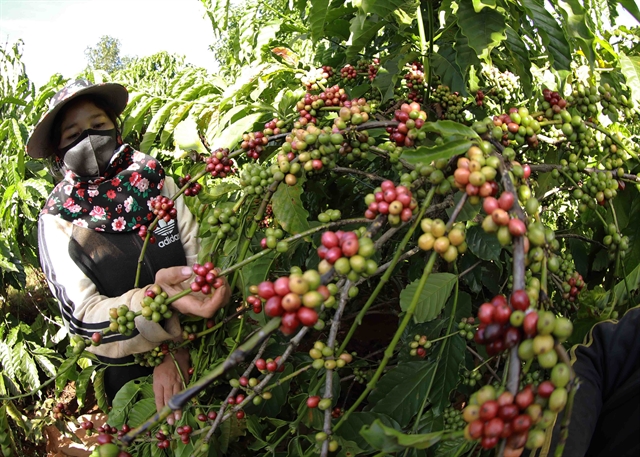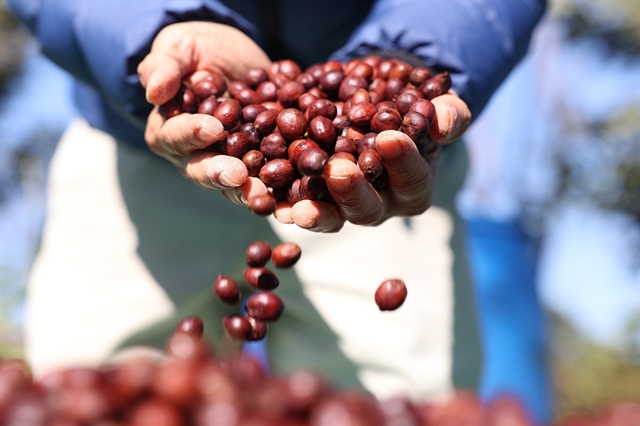 Economy
Economy


|
| A farmer harvests coffee in Gia Lai Province. Sustainable production is key for producers to make the most of the UK – Việt Nam Free Trade Agreement (UKVFTA). — VNA/VNS Photo Vũ Sinh |
HÀ NỘI — Sustainable production is the critical factor for Vietnamese coffee producers if they want to maximise opportunities offered by the UK – Việt Nam Free Trade Agreement (UKVFTA).
To grow and consolidate their foothold in the UK market, they have to prove they are sustainable and eco-friendly, to meet the needs of demanding British consumers.
Coffee is one of the country's exports which has successfully taken advantage of the UKVFTA, expanding thanks to the tariff liberalisation, which makes Vietnamese coffee more competitive.
Statistics showed that Việt Nam’s coffee exports to the UK reached US$90.8 million in 2022, representing an increase of 61.1 per cent over 2021 when the trade deal took effect.
Data from the International Trade Council (ITC) showed that Việt Nam is the second largest among 95 coffee suppliers to the UK in the first five months of 2024, with an export volume of 15,330 tonnes, valued at $51.2 million.
Despite a 22 per cent decrease in volume in the period, Việt Nam’s coffee export value rose by 12.2 per cent thank to a significant price increase. The average import price from Việt Nam surged by 45.4 per cent to $3,378 per tonne in the period while the average import price from Brazil, Germany and Colombia decreased.
The latest updates from the General Department of Customs showed that coffee export to the UK valued $121.25 million in January – November, making the UK the fifteenth largest market of Vietnamese coffee in the period. The UK contributed significantly to Việt Nam’s record coffee export worth $4.48 billion, up 32.8 per cent in the 11-month period.
“The UKVFTA with the high level of tariff liberalisation has contributed largely to expand exports of Vietnamese products, including coffee to the UK,” Vũ Việt Thành from the European-American Market Department under the Ministry of Industry and Trade said.
The trade deal removed 85.6 per cent of the tariff lines for Việt Nam from January 1, 2021 and 99.2 per cent from January 1, 2027. The rest will enjoy zero tariff within the quotas.
There is still a large slice of untapped potential for Việt Nam to expand coffee exports into the UK.
According to the Việt Nam Trade Office to the UK, although the country is traditionally thought of as a nation of tea drinkers, over the years, there has been a growing trend towards drinking more coffee, especially among young people. Surprisingly perhaps the UK is currently the fifth largest coffee consumer market in Europe, after Germany, Italy, France and Spain.
According to ITC, the UK coffee market is forecast to grow at 10.98 per cent in 2025, driven by that growing coffee interest.
In tandem, consumers are showing greater interest in buying and drinking coffee which is certified in terms of quality, environment and labour practices.
It is also vital to improve quality and develop brands for Vietnamese coffee in the UK market.
Deputy President of Việt Nam Coffee and Cocoa Association Thái Như Hiệp pointed out that although Việt Nam is the second largest coffee suppliers to the UK, the brand of finished Vietnamese coffee products is not yet well rooted in the market. Roasters are importing Vietnamese coffee beans then selling them under their own brands, so very few Vietnamese coffee brands have registered for protection in the UK.
Focus on sustainability

|
| Coffee manufacturers and exporters should invest in improving the sustainability of coffee value chain together with focusing on improving the product quality to expand exports. — VNA/VNS Photo Tuấn Anh |
To further make the most of the UKVFTA opportunities, the focus must be on improving the sustainability of the coffee value chain, according to the Việt Nam Trade Office to the UK.
British consumers are increasingly aware of the impacts on the environment of their purchasing decision and tend to read the labels very carefully, with the focus on information about environment, social and governance (ESG) practices. They are attracted by well produced, clear and eco-friendly packaging.
So the advice is that coffee manufacturers and exporters should invest in improving the sustainability of their products, together with improving the product quality to better take advantage of both the UKVFTA and the Comprehensive and Progressive Agreement for Trans-Pacific Partnership to expand internationally.
Also on the horizon, both the EU and UK are gearing up for unprecendented regulations to prevent deforestation.
Although the UK is no longer a member of the European Union (EU), Vietnamese coffee manufacturers and exporters need to pay attention to and comply with the EU Deforestation Regulation (EUDR) because of its global impact.
The UK’s Environment Act 2021 made provision for the government to establish a due diligence system for forest-risk commodities including soy, palm oil, cocoa, maize, beef, leather, rubber and coffee.
In late 2023, the initial scope of the due diligence system was introduced with four commodities to be subject to the system cattle products (excluding dairy), cocoa, palm oil and soy, meaning that maize, rubber and coffee were left out of this initial scope.
However, Vietnamese coffee manufacturers and exporters still need to be well prepared for EUDR, although the obligations have been postponed for a year to December 31, 2025, given its overall aim of improving ESG practices in the global coffee market, as well as enhancing traceability and transparency. — VNS